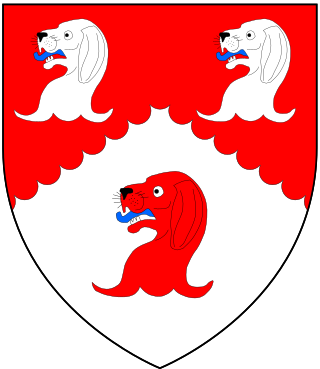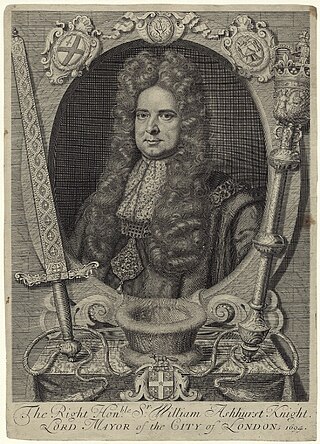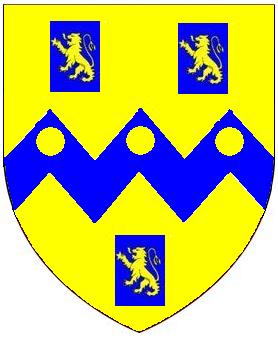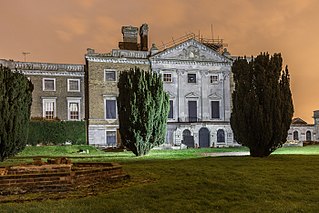Related Research Articles

Sir John Houblon was an English merchant and banker who served as the first governor of the Bank of England from 1694 to 1697. He also served as the Lord Mayor of London in 1695.

Sir Gilbert Heathcote, 1st Baronet was an English merchant and Whig politician who sat in the English and British House of Commons between 1701 and 1733. He also served as the governor of the Bank of England and was Lord Mayor of London in 1711.

Sir Charles Duncombe of Teddington, Middlesex and Barford, Wiltshire, was an English banker and Tory politician who sat in the English and British House of Commons between 1685 and 1711. He served as Lord Mayor of London from 1708 to 1709. He made a fortune in banking and was said to be worth £400,000 later in life, and the richest commoner in England on his death.

Sir William Ashhurst was an English banker, merchant and Whig politician who sat in the English and British House of Commons from 1689 to 1710. He also served as the Lord Mayor of London in 1693.

William Stanton (1639–1705) was an English mason and sculptor. He is known particularly for monumental masonry. He is often ferred to as Stanton of Holborn.
The Governor of Chester was a military officer responsible for the garrison at Chester Castle. The equivalent or related role from the 11th to 14th centuries was Constable of Chester.

John Rolle of Stevenstone and Bicton in Devon, was a British landowner and Tory politician who sat in the English House of Commons from 1703 to 1705 and in the British House of Commons from 1710-1730. He declined the offer of an earldom by Queen Anne, but 18 years after his death his eldest son was raised to the peerage in 1748 by King George II as Baron Rolle.

Henry Seymour later Portman, of Orchard Portman, Somerset, was an English politician who sat in the House of Commons of England and then Great Britain almost continually between 1679 and 1715.
Francis Annesley, FRS was an Irish lawyer and politician who sat in the Irish House of Commons between 1692 and 1714, in the English House of Commons from 1705 to 1708 and in the British House of Commons between 1708 and 1734.

Sir Thomas Webster, 1st Baronet, of Copped Hall, Essex, and Battle Abbey, Sussex, was a British landowner and Whig politician who sat in the English and British House of Commons between 1705 and 1727.

Sir John Parsons of The Priory, Reigate, Surrey, was an English brewer, Royal Navy victualler and Tory politician, who sat in the English and British House of Commons between 1685 and 1717. He was Lord Mayor of London in 1703.
Colonel Maynard Colchester, of Westbury Court and the Wilderness, was an English lawyer and politician who sat in the English and British House of Commons from 1701 to 1708.

Sir Thomas Livingstone, Viscount Teviot was a military officer of Scottish descent who was born in the Dutch Republic, and spent his career in the service of William of Orange.
Sir Robert Bedingfield (1637–1711) of Ludgate Street, London, was a British merchant and politician who sat in the House of Commons in 1701. He was Lord Mayor of London in 1706.
Sir William Lewen, of Ewell, Surrey, was a British merchant and Tory politician who sat in the House of Commons between 1708 and 1722. He was Lord Mayor of London in 1717.
Sir Thomas Clarke, of Brickendon, Hertfordshire, was a British lawyer and Whig politician who sat in the English and British House of Commons between 1705 and 1741.
Joseph Williams was an English stage actor of the seventeenth and early eighteenth century.
References
- 1 2 3 J R Woodhead. "'Cade - Cutler', in The Rulers of London 1660-1689 A Biographical Record of the Aldermen and Common Councilment of the City of London (London, 1966), pp. 42-56". British History Online. Retrieved 14 January 2019.
- 1 2 3 Alfred P Beaven. "'Chronological list of aldermen: 1651-1700', in The Aldermen of the City of London Temp. Henry III - 1912 (London, 1908), pp. 75-119". British History Online. Retrieved 10 December 2018.
- ↑ "'Parishes: Hertford (All Saints' & St John's)', in A History of the County of Hertford: Volume 3, ed. William Page (London, 1912), pp. 409-414". British History Online. Retrieved 13 January 2019.
- 1 2 3 "CLARKE, Thomas (c.1672-1754), of Brickendon, Herts". History of Parliament Online (1690–1715). Retrieved 10 January 2019.
- ↑ "Brickendonbury Estate History". tarrc.co.uk. Retrieved 14 January 2019.
- ↑ "COLCHESTER, Maynard (1665-1715), of Westbury Court, Westbury-on-Severn, and the Wilderness, Abbinghall, Glos". History of Parliament Online (1715–1754). Retrieved 10 January 2019.
